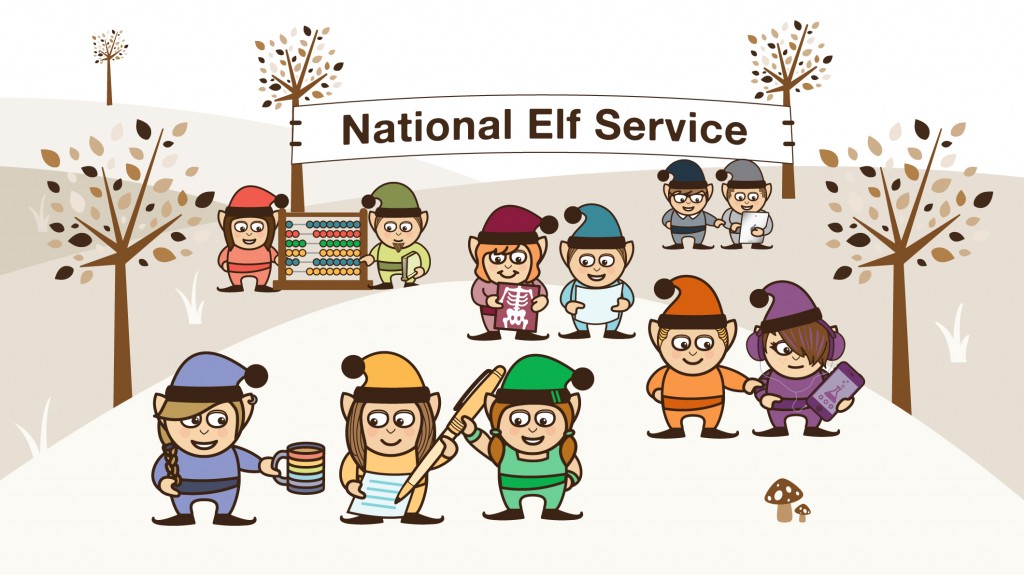
This is our 1,000th Mental Elf blog and so I thought now would be a good time to reflect on what we have achieved since starting this website in the Spring of 2011.
Today’s blog will:
- Look back at the last 3 years and consider what research we’ve covered, what’s worked well and what we need to improve
- Look forward to next year and our exciting plans for launching the National Elf Service
- We want your comments (good, bad and indifferent), so please take two minutes to tell us what you think of the Mental Elf
- And if you love what we do, please show your love by voting for us in the UK Blog Awards
Keeping up to date with the Mental Elf
We have always been clear about our aims and objectives; to help busy health and social care professionals keep up to date with reliable mental health research.
For the last three and a bit years we’ve done this by publishing five blogs each week that highlight evidence-based research that we think is interesting and relevant.
It’s never been harder to keep up to date with the best available evidence. Sure, we have the technology, but there’s a mountain of guidelines, policy documents and research papers published every week and people just don’t have the time to read it all and decide what’s relevant to them. What’s more, many professionals don’t have the critical appraisal skills to work out if relevant evidence is reliable.
Our followers seem to like our brief, readable blogs with clinical commentaries, written by our ever-growing team of expert bloggers. So we’ve expanded beyond mental health into lots of different areas:

The woodland is filling up nicely, with elves covering learning disabilities, social care, child health, commissioning and much more.
Subject coverage
We have tried to feature evidence that is relevant to UK mental health practice in our blogs so far and looking back we can see the most popular mental health conditions have been:

The Social Care Elf website is now live. Do drop by & say hello! thesocialcareelf.net
- Depression
- Substance misuse
- Schizophrenia
- Anxiety disorders
- Psychosis
- Dementia
- Suicide and self-harm
- Bipolar disorder
- ADHD
- PTSD
What’s missing from this list? What mental health conditions would you like to see covered in our top ten?
We prioritise high quality study designs and you can see this looking at the most popular publication types that we have included:
- Systematic review
- Meta-analysis
- Randomised controlled trials
- Cohort studies
- Guidelines
The interventions we primarily cover are the usual suspects:
- Psychotherapies
- Antidepressants
- Antipsychotics
- Exercise
- Mood stabilisers
What would you like to see featured more often on the site? Please share your thoughts in the comments below.
Our contributors
By far the most pleasing aspect of running this website has been the way in which other health professionals, researchers, students, librarians and service users have come together to contribute their blogs. I invited others to start writing early in 2013 and since then we have built up a dedicated team of expert elves from all over the world. I owe a huge debt of gratitude to this team of intrepid and dedicated people, who all give up their time for free, safe in the knowledge that the Great Elf Mother is smiling down on them.
Special mention has to go to two teams of people who have contributed a huge number of blogs between them:
- Marcus Munafò and colleagues (Suzi, Amy, Olivia, Helen, Meg and Sally) at the University of Bristol Tobacco and Alcohol Research Group
- Matt Field and his colleagues (Paul, Andy and Abi) at the University of Liverpool Addiction Research Group
But everyone who has contributed has been brilliant. We now have 85 bloggers from 10 different countries and we still welcome contributions from people with the right combination of skills and expertise. Find out more and get involved yourself.

Have we got the right mix of people blogging on the website? Would you like to see more contributions from a particular group?
Our audience
But of course it’s you, dear readers, who mean the world to us elves. It’s getting chilly now in the woodland and the campfire isn’t always roaring, but our cockles are warmed every time we think of your delighted faces; opening a new blog and eagerly reading about new and valuable research.
We are expecting somewhere in the region of half a million page views in 2014, which is double what we had in 2013. Our Twitter following has recently passed 22,000 and we are steadily building an audience on Facebook, Google+ and LinkedIn as well. Our free monthly email newsletter is also a popular way of keeping up to date.
It makes it all worthwhile when we meet new readers and get positive feedback from mental health experts, professionals and service users alike. Thank you all for your continued interest in what we do and please keep sending constructive comments so we can improve the service.
Our most popular blogs
We are always evaluating what we do and trying to build on what works well. Popular blogs are those that bring in lots of readers, but more than that, those that succeed in getting people to engage with the evidence. That might mean taking on-board some new knowledge and using it in practice, it might mean participating in an organised discussion (a tweet chat or webinar) and sometimes it’s simply an evidence bun-fight where researchers, practitioners, clinicians and the rest of us get together online for some bare-fisted debating.
Here are some of the blogs we’ve published in recent months that we think have been especially engaging:
- No support for peer support?
- Pilot study suggests that CBT may be a viable alternative to antipsychotics for people with schizophrenia, or does it?
- People with mental illness are more likely to be victims of homicide than perpetrators of homicide
- Placebo for depression: are some sugar pills better than others?
- Psychotherapy trials should report the side effects of treatment
- Alternatives to medication for agitation in dementia
- Cannabis, cigarette smoking and psychosis: do we need a rethink?
- New evidence on antidepressants and suicide risk in children and young people
- Long term maintenance treatment with antipsychotics: a cautionary note from recent research
- New NICE guidance recommends that all NHS hospitals and clinics become completely smoke-free

What should we be doing to make our blogs more engaging?
Our plans for 2015 and beyond
We will be launching the National Elf Service next year, which will bring together all eleven existing elves into one wonderful website. We are really excited about all the new features and functionality that the new site will bring.
When you join the National Elf Service you will become an elf and start playing a game that will incentivise you to:
- Keep up to date with the latest evidence-based research,
- Connect with colleagues and experts in your field, and
- Track your learning and contribute to your continuing professional development.
We’ll be announcing more details about Elf Notes, Badgers, Campfires and Elf Professors before too long. The wait is almost over ;-)
Please vote for us now!
Finally, we are delighted to announce that we have been nominated for the UK Blog Awards. Please take a minute to show your appreciation for all the hard work that has gone into making this site what it is, by voting for us:


RT @Mental_Elf: Do you value your Mental Elf? http://t.co/BoCSV2nG73
CONGRATULATIONS to the fantastic @Mental_Elf on their 1000th blog!
Take a look!
http://t.co/9AhrUHFBdQ
Do you value the mental elf? http://t.co/u96gcr7cZg
Do you value your Mental Elf?: Today, as we publish our 1,000th blog, André Tomlin looks back at the last 3 ye… http://t.co/oh5rjBN5PJ
Voted. Good luck.
@Mental_Elf yes it’s really useful – I’ve voted too
@Mental_Elf 1000th blog – a fantastic milestone http://t.co/S1YZQ0dZeD
Today is the @Mental_Elf ‘s 1000th blog, and thank you Andre for the special mention for our group! http://t.co/wblQqDzAKL
I might have published a first blog but big brother @Mental_Elf is on one thousand! *looks up at him with wide eyes* http://t.co/JEorL7xD2c
June Dunnett liked this on Facebook.
Susanne Hart liked this on Facebook.
Catherine Hanna liked this on Facebook.
1000th blog today! Happy birthday @Mental_Elf http://t.co/fE7I7NFM8s
A proud day to be a Mental Elf. Read the 1000th blog today. http://t.co/gc73SfnZwr via @sharethis
Shelley Louise liked this on Facebook.
Today we’ve published our 1,000th blog! It’s time to take stock and find out what YOU think. Please tell us: http://t.co/iddyLWGK2G
@Mental_Elf Congratulations on 1000 posts Elves!
Do vote for the @Mental_Elf in the UK Blog Awards and read Andre’s inspiring story about about the road to the 1000th Blog. A proud day to be in the woodland http://www.thementalelf.net/publication-types/website/do-you-value-your-mental-elf/
Big congrats to the Mental Elf on their 1000th blog. Vote for them in the blog awards! http://t.co/nEpOosUe83 via @sharethis
What mental health topics would you like to see covered more on the Mental Elf website? http://t.co/iddyLWGK2G
@Mental_Elf celebrates 1000 blogs and asks us: “what do we want to read?” Also, don’t forget to vote for “us elves” http://t.co/B9P2PBfOND
@Mental_Elf Community-based mental health initiatives aimed at prevention and mental health ‘first aid’
RT @BristolTARG: Today marks the 1000th @Mental_Elf blog. Well done to all @BristolTARG writers – we even get a special mention! http://t.c…
Richeldis Yhap liked this on Facebook.
Who would you like to see writing blogs for the Mental Elf? Make suggestions and sign up yourself: http://t.co/iddyLWGK2G
Congratulations to @Mental_Elf on reaching 1000 blogposts. Many more please! http://t.co/Sg5R8HltEl
It is really a commendable job and great service by elves in spreading knowledge on wide variety of topics. Good Going. Best Wishes.
Vote for @Mental_Elf in UK Blog Awards http://t.co/nAkf6PBpS4 & read Andre’s 1000th blog. Proud day to be an elf! http://t.co/BXhchmPHFf
How can we make our Mental Elf blogs more engaging? All ideas and comments welcome: http://t.co/iddyLWGK2G
The @Mental_Elf celebrates its 1000th post! Proud of my 1% elf economics contribution http://t.co/BhyVNsiqji
Happy to be congratulating @Mental_Elf and my fellow elves on the 1000th blog http://t.co/UCzH9Pm5Lg but what do you think of what we do?
If you’d like to suggest things for Mental Elf to do or sign up as a contributor yourself, you can do that here: http://t.co/ZM1hSXCxW7
RT @JohnBaker_UoM: As Mental Health Nurse @Mental_Elf keeps me up to date – but is it nurse friendly? http://t.co/S1YZQ0dZeD @MHNAUK @Skell…
@JohnBaker_UoM Great question John. Really interested in constructive feedback: http://t.co/iddyLWGK2G @MHNAUK @SkellernLecture @BenT_DH
would be still in the dark ages without you!
It’s @Mental_Elf’s 1000th blog post. That’s loads. More than 10 I reckon. Well done. Evidence and that. http://t.co/fMifuV02JY
Congrats to @Mental_Elf 1000th blog today! http://t.co/JNokzsmiRH
Mental Elf: Do you value your Mental Elf? http://t.co/BwVDfArUHX
In terms of the top 10 mental health conditions I would take out dementia and put in personality disorders. Although there is comorbidity, dementia is a neurological disorder and not truly mental health. In contrast, personality disorders are complex and pernicious mental health conditions that are particularly difficult to treat.
@mental_Elf celebrating 1000 diverse blogs on aspects of psychological health! http://t.co/SWX85RCXTP
Sarah Steed liked this on Facebook.
Find out more about our plans for 2015 and beyond! http://t.co/iddyLWGK2G
Don’t miss: Do you value your Mental Elf? http://t.co/iddyLWYlaK
Mental Elf – 1,000 blogs young. Shape it’s future.. http://t.co/0vYGFkxZ9V via @sharethis
RT @Mental_Elf: Don’t miss: Do you value your Mental Elf? http://t.co/8bfLItiqkM <worth a vote if you find helpful @strategiesuws
The Mental Elf hits 1000! Congrats and Thank you for providing this valuable service! http://t.co/ld5aOQSOfj via @sharethis
Do you value your Mental Elf? http://t.co/nGE0E5f8VG from @Mental_Elf
[…] The Social Care Elf cannot possibly blog about every piece of research which is published, so it is important to use it alongside other sources of social care research to hear about all the latest developments. For example, mental health social workers may be interested in the Mental Elf, who blogs about mental health research. This elf has been busy for the past three years bringing us critical appraisals of mental health research and has recently reached its 1,000th blog. […]
I think Mental Elf is beautifully curated, and urge you to continue to debunk the non evidence-based politically correct programs that market themselves with a platitude parade rather than evidence. To be ‘evidence based’ a program should be ‘independently proven’ to improve a ‘meaningful outcome’ in people with ‘serious mental illness’. Programs that say, improve ‘outlook’ ‘sense of hope’ or ‘feeling of wellness’ are likely no more effective than bowling and the research is almost always conducted by the inventor/vendor. Programs like peer support, WRAP, MHFA, CBT , DBT, ‘early intervention’, ‘prevention’ are well funded but often lacking in evidence. So thank you for what you do and keep it up.